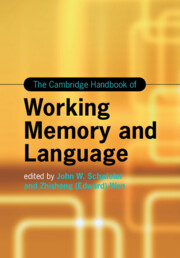Book contents
- The Cambridge Handbook of Working Memory and Language
- Cambridge Handbooks in Language and Linguistics
- The Cambridge Handbook of Working Memory and Language
- Copyright page
- Contents
- Figures
- Tables
- About the Editors
- About the Contributors
- Acknowledgments
- Overview of the Handbook
- Part I Introduction
- Part II Models and Measures
- Part III Linguistic Theories and Frameworks
- Part IV First Language Processing
- Part V Bilingual Acquisition and Processing
- 24 How Measures of Working Memory Relate to L2 Vocabulary
- 25 Working Memory and L2 Grammar Development in Children
- 26 Working Memory and L2 Grammar Learning among Adults
- 27 Working Memory and L2 Sentence Processing
- 28 Methodological Issues in Research on Working Memory and L2 Reading Comprehension
- 29 Working Memory and Second Language Speaking Tasks
- 30 Working Memory in Second Language Interaction
- 31 Working Memory and Interpreting Studies
- 32 A Methodological Synthesis of Working Memory Tasks in L2 Research
- Part VI Language Disorders, Interventions, and Instruction
- Part VII Conclusion
- Index
- References
29 - Working Memory and Second Language Speaking Tasks
from Part V - Bilingual Acquisition and Processing
Published online by Cambridge University Press: 08 July 2022
- The Cambridge Handbook of Working Memory and Language
- Cambridge Handbooks in Language and Linguistics
- The Cambridge Handbook of Working Memory and Language
- Copyright page
- Contents
- Figures
- Tables
- About the Editors
- About the Contributors
- Acknowledgments
- Overview of the Handbook
- Part I Introduction
- Part II Models and Measures
- Part III Linguistic Theories and Frameworks
- Part IV First Language Processing
- Part V Bilingual Acquisition and Processing
- 24 How Measures of Working Memory Relate to L2 Vocabulary
- 25 Working Memory and L2 Grammar Development in Children
- 26 Working Memory and L2 Grammar Learning among Adults
- 27 Working Memory and L2 Sentence Processing
- 28 Methodological Issues in Research on Working Memory and L2 Reading Comprehension
- 29 Working Memory and Second Language Speaking Tasks
- 30 Working Memory in Second Language Interaction
- 31 Working Memory and Interpreting Studies
- 32 A Methodological Synthesis of Working Memory Tasks in L2 Research
- Part VI Language Disorders, Interventions, and Instruction
- Part VII Conclusion
- Index
- References
Summary
This chapter starts by providing brief accounts of both first and second language speaking, and then surveys empirical work, measurement issues, and theory on the use of second language speaking tasks – the sort of tasks, often with real-world connections, used in communicative language classrooms to nurture second language development and performance. The main section of the chapter is concerned with the relationships between working memory and performance on such tasks. Broadly it is argued that, as yet, there are not many systematic findings relating task characteristics, working memory, and actual performance. In contrast, the conditions under which second language speaking tasks are done (such as planning opportunities, repeated tasks) do show some interesting results. Based on such research, it is argued that working memory plays more of a role in the Formulation stage of speech production. Proposals are made regarding the areas where it would be most helpful to research working memory connections with second language speaking tasks.
Keywords
Information
- Type
- Chapter
- Information
- The Cambridge Handbook of Working Memory and Language , pp. 635 - 655Publisher: Cambridge University PressPrint publication year: 2022
References
Accessibility standard: Unknown
Why this information is here
This section outlines the accessibility features of this content - including support for screen readers, full keyboard navigation and high-contrast display options. This may not be relevant for you.Accessibility Information
- 2
- Cited by
